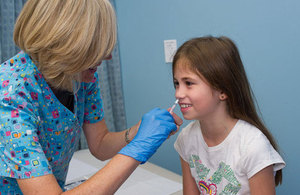Child flu vaccine pilots announced for second year
Child flu vaccine pilots enter their second year, and a new set of locations have been announced.

Nasal vaccine
More than 700,000 healthy school-aged children across England are to be offered a free flu vaccination for the winter, as the successful child flu vaccine pilot programme launched in 2013 by Public Health England (PHE) enters the second year.
In 2013 to 2014 vaccinations were offered to primary school-aged children in a cross-section of urban, rural and inner city settings. New for this year, there will also be further pilots for children in years 7 and 8 (aged around 11 to 13 years) in selected secondary schools around the country. Most children who will be offered the vaccine in pilot areas will be given it as a nasal spray.
In addition to protecting healthy children from flu, the pilots aim to reduce the spread of flu and protect younger siblings, grandparents and others who are at increased risk of becoming seriously ill from flu.
The Department of Health (DH), based on a recommendation received from the Joint Committee on Vaccination and Immunisation (JCVI) in July 2012, decided to extend the national flu programme to all children from the age of 2 to less than 17 years. This extension is being phased in, and the pilots are determining the best approach to implementing the programme for school-aged children, so that the programme can be implemented efficiently and sustainably, without putting pressure on other essential services.
This autumn, all children aged 2, 3 and 4 will also be offered a nasal spray vaccine to protect them against flu. This accompanies the existing flu programme, which provides flu vaccination to anyone in an at risk group, pregnant women and those aged 65 or over.
Dr Paul Cosford, Director for Health Protection and Medical Director at PHE, said:
The pilots are an important addition to the national programme and are being carefully planned for the second year running. They are helping us to understand the best way to implement the programme nationally, ensuring that we can set up a successful and sustainable programme, vaccinating children and young people to protect them and the wider population.
It’s important that children take up the offer of a vaccination if offered to them later in the year. Every year, 100s of 1000s of people may see their GP and 10s of 1000s may be hospitalised because of flu each winter.
Dr Mary Ramsay, PHE’s head of immunisation said:
Last year there was an overall uptake of 52.5% in school-age children and early findings from the pilots suggest a likely impact of vaccinating on levels of flu circulating more widely.
The high uptake levels achieved in most pilot areas last year using school-based delivery demonstrate the feasibility of achieving high coverage levels and this is encouraging as we approach the second year of the pilots. However, it is important that we continue this on-going close monitoring of the programme.
In the specific pilot areas where vaccination is to be offered to school-age children, local NHS screening and immunisation teams are now in the process of making arrangements to ensure they can offer the vaccinations in the autumn. Details of how the pilots will be delivered locally in these areas will be available later in the year.
An NHS England spokesperson said:
NHS England will continue to commission and ensure the delivery of the national flu programme across England. The fact that it’s been extended to children and young people via the Healthy Schools Programme is a positive, benefitting both children and their families.
Ends
Notes to editors
- In 2014 to 2015, pilots will be carried out in parts of the following areas:
| Pilot Area 2014 to 2015 | School Cohort |
|---|---|
| Cumbria, Northumberland, Tyne and Wear | Primary |
| Greater Manchester | Primary and secondary |
| Lancashire | Secondary |
| North Yorkshire and Humber | Secondary |
| Sheffield, Rotherham, Doncaster and Bassetlaw | Secondary |
| West Yorkshire | Secondary |
| Arden, Herefordshire and Worcestershire | Secondary |
| Birmingham, Solihull and The Black Country | Secondary |
| East Anglia | Secondary |
| Essex | Primary and secondary |
| Leicestershire and Lincolnshire | Primary and secondary |
| Shropshire and Staffordshire | Secondary |
| London | Primary and secondary (year 7) in parts of London. All children in special schools across London. |
-
The seasonal flu vaccination programme is based on independent expert advice from the Joint Committee on Vaccination and Immunisation (JCVI). The aim of the current flu vaccination policy is to reduce the serious morbidity and mortality due to flu by immunising those people most at risk of serious illness or death should they develop flu. This is in line with most other countries that have seasonal influenza vaccination programmes.
-
Pilots were designed to test which delivery method is the most efficient and is well-accepted by parents and children, and not to test the vaccine which has a long track record in the US. Posters highlighting ‘Which flu vaccine should you or your child have’ and ‘5 reasons to get your child vaccinated against flu’ are available online
-
The new child flu leaflet is now available online.
-
PHE exists to protect and improve the nation’s health and wellbeing, and reduce health inequalities. It does this through advocacy, partnerships, world-class science, knowledge and intelligence, and the delivery of specialist public health services. PHE is an operationally autonomous executive agency of the Department of Health. www.gov.uk/phe Follow us on Twitter @PHE_uk